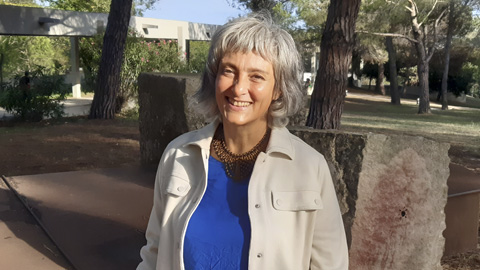"Environmental education must form an integral part of a person's education"
Pedagogue Heike Freire has spent more than 25 years studying how to transform education and human development by using the values of care and love for nature. And educational approach she calls green pedagogy, which she explains in detail in her three books: Educar en verde, translated into six languages, ¡Estate quieto y atiende! and Patios Vivos. She also gives conferences, courses and workshops on the subject around the world. She recently visited the UAB to inaugurate the 2022/23 academic year at the Faculty of Education.

“We need a cultural transformation to approach our relationship with Earth in another way”
- What is green pedagogy and what is its objective?
- It is an educational approach that is interested in environmental problems from a human perspective. Green pedagogy is at the vertex between environmental education and formal education, which I call cycle of life. The proposal is to unify the two. Until now, environmental education has been dominated by a technocratic vision and highly focused on changing habits. But there is a deeper way of educating about the environment, which is helping a person construct themselves as a subject connected to the Earth and nature. This pedagogy a aims to accompany the person in their integral development as a human, since this is beneficial for every one of us and it is the way for us to have a better and more respectful relation with nature.
- Is environmental education not enough?
- The thing here is to realise that environmental education must form an integral part of a person's education. We are talking about a need for a cultural transformation to approach our relationship with Earth in another way. Not only is this about getting someone to recycle, for example, but about how this person grows in relation to their world. Their awareness that their sense of fulfilment and happiness and that of other beings is all interdependent.
- You see environmental problems as human problems.
- They are not only technical problems, of course not. Gustav Speth, consultant to the White House on climate change, believed at the start of his career that the main environmental problems were climate change, the loss of biodiversity and the collapse of ecosystems. Thirty years later he realised that the main problems were actually egoism, greed and apathy. It is not only a topic for scientists, but also for educators and pedagogues.
- Is Spain a place open to the educational approach of a green pedagogy?
- There was an awareness of the need to connect with nature before Franco's dictatorship, with educators such as Rosa Sensat and centres such as the Institución Libre de Enseñanza. We were one of the first countries to have forest schools and teachers came from abroad to learn more in this area. But then came an education and professions related to human relations that were conducted in closed spaces. Later there was a relevant surge in interest, in these past few decades. There is an eagerness to once again be in contact with nature, particularly now after the pandemic.
- What is the current situation?
- I think we are doing well at the education level. There are many schools that have transformed their playgrounds into more natural environments and use them to learn. The idea that girls and boys need to grow in constant contact with nature is fairly widespread, and this is fundamental because it is the environment in which humans have evolved throughout their history. The same cannot be said in other areas, such as nursing homes, prisons, or hospitals, and much needs to be done in these cases.
- What benefits does green pedagogy have on children's values and knowledge?
- I use a diagram in my conferences that summarises the results of studies conducted from the mid 1970s until today in environmental psychology, both with adults and children, and that demonstrate the benefits of being in contact with nature. We know that it improves physical development, health and emotional intelligence. It makes us more resilient, less stressed out, we become more empathics and we work together instead of competing, we are more creative and have a larger attention span and memory. And these benefits exist at all levels, that is why we say that a green pedagogy is a holistic pedagogy, aimed at all the dimensions of a human being.
- Is it better to encourage that classes be given outdoors?
- Yes, but the important part is not to do the same outside as we would inside a class, but to do it in connection with nature and to change our way of being, seeing and treating our world. It is not hte natural surroundings in themselves, it is how we are connected to these surroundings. In our western culture we have a huge problem with the concept of nature as we see it. It is very abstract, as if we did not belong to it. In other cultures, human beings are an inseparable part of nature. If we work on being aware of our connection with nature, children will grow better and feel more a part of it.
- What is your opinion on the use of digital technologies and how should they coexist with a green pedagogy?
- I am quite critical about them. They affect the brain's development, the nervous system, sensory and emotional development, intuition, etc. Ever since the first workshops I did, more than twenty years ago, the world has gone against what I and other experts recommended to parents and educators. Digital technology is a reality we must live with, but the question is how. It should be introduced gradually, depending on a person's development and the vital needs of each stage in life. It is obvious that a small child does not need screens to grow and interact with their world, quite the contrary, screens make their learning process more difficult.